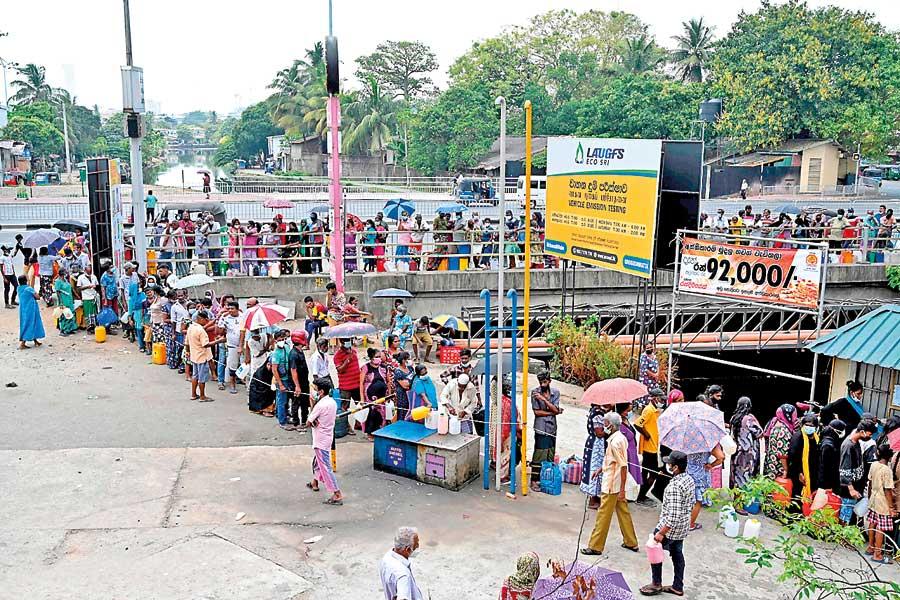Reply To:
Name - Reply Comment
Last Updated : 2024-05-10 21:33:00

Amid a severe gas shortage, at a petrol station in Colombo, people stand in a queue to buy kerosene oil for home stove. AFP
The unprecedented yet not unforeseen economic crisis, foreign exchange crisis and debt crisis Sri Lanka is going through with people dying and being killed in queues for their basic needs have a geopolitical and geoeconomic parallel in 19th century Egypt.
needs have a geopolitical and geoeconomic parallel in 19th century Egypt.
During the first half of the 19th century, semi-autonomous Egypt was under Ottoman suzerainty. It was a prosperous nation. Egypt’s warrior ruler Muhammad Ali, an Ottoman military commander of Albanian origin, had laid the foundation for economic prosperity through a programme of industrialization under state capitalism.
Muhammad Ali sought no foreign loans to develop the country’s peasant economy. His industrialization drive continued even after the British-French military intervention which compelled him to give up control of Syria and Palestine.
However, Muhammad Ali’s successors fell into the debt trap Britain had laid for them. They adopted free trade and dismantled state monopolies. Financial assistance flowed in from British and French banks for unsolicited ‘bait’ projects. The home-grown prosperity the Egyptians had experienced during Muhammad Ali’s period, now depended on foreign loans. The situation set in motion a process that forced Egypt to sell its infrastructure to Western powers, European banks and unscrupulous entrepreneurs. Egyptian rulers blindly dragged the country into the debt trap laid by colonial powers.
The Egyptian government believed it could pay back loans with easy-to-obtain more loans and revenue earned from exports. During the American Civil War from 1861 to 1865, Egypt as a key exporter of cotton benefitted from the steep rise in world market prices. This prompted the over-confident yet economically dimwitted Ismail Pasha Government to borrow more money from Western sources. But when cotton prices plummeted after the end of the American Civil War, with southern states resuming their exports, Egypt faced problems with regard to repayments.
Despite Egypt’s plunging creditworthiness, British and French banks continued to lend more money to it at higher interest rates. It was colonization through debt traps.
In the 1870s, Egypt’s debt servicing absorbed two thirds of the state revenue and half of exports. Yet, Egypt was prodded by the western lenders to borrow more to repay its loans. Of course, when the going got tough, the loans came with tougher conditions.
Soon, Egypt found repayment unsustainable. Within 15 years, Egypt’s sovereignty was severely undermined, with economic policy being dictated by creditors. Britain and France set up an ad hoc institution that ordered the Egyptian government what to do and what not to do, just as the International Monetary Fund does today to nations that seek its help.
Called the Public Debt Fund, it coaxed Egypt to accept its instructions which were largely in favour of lending powers. When Egypt was unable to repay the loans, the lenders coerced it to hand over to them the infrastructure facilities built with money borrowed from them.
Short of revenue, the government increased the taxes to meet debt servicing commitments and avoid default. Needless to say, the cost of living kept increasing.
Yet, the Public Debt Fund kept on urging the Egyptian government to take unpopular austerity measures, deliberately aimed at triggering a rebellion against the government. Even the Egyptian military launched a rebellion.
Finally, the government ran out of options and was forced to sell its Suez Canal shares – nearly 50 percent – to Britain in 1875, while the people revolted against the government saying “enough is enough”.
When the country was in chaos, Britain and France sent in troops, ostensibly to protect their economic interests, including the Suez Canal. The Egyptian military resisted, but soon it was overpowered and Egypt became a protectorate of Britain.
The French wanted a piece of the Egyptian pie. But Britain talked the French into accepting a deal under which Paris was given the control of Tunisia.
For a country like Sri Lanka which is neck deep in foreign debt and forced to follow instructions from modern-day colonialists, Egypt’s history offers vital lessons. But it appears most developing countries are repeating the mistakes 19th century Egypt had committed. As a result, they become prey to geopolitical vultures with hegemonic designs.
Sensing a major balance of payment crisis amid early signs of the dwindling foreign reserves, Sri Lanka’s previous government handed over the strategically significant Hambantota port on long-term lease to China, which also has control over the portion of the port city being built in Colombo. China is also eyeing an islet close to the Hambantota port, claiming it wants to set up an entertainment park. The previous government declined to entertain its request.
Opposition parties allege that the dollar-starved government in desperation is selling Sri Lanka’s strategic infrastructure facilities to foreign powers, including India.
India is said to have sought a series of concessions as condition to release more than US$ 1 billion the Sri Lankan government was desperately seeking to stay on in power amidst growing public discontent over rising prices.
India’s demands range from security and defence arrangements to economic development projects. Added to India’s basket recently are the Trinco oil farms and two power projects in strategic locations. This week, India proposed a series of maritime security agreements aimed at strengthening its hold, particularly around the eastern Trincomalee harbour. The agreements, which are likely to veer Sri Lanka away from China’s orbit and place it on the US-led ‘Quad’ security orbit, are expected to be signed when India’s External Affairs Minister S. Jaishankar will be in Sri Lanka for the March 30th BIMSTEC (the Bay of Bengal Initiative for Multi-Sectoral Technical and Economic Cooperation) summit.
India also demands greater devolution for provincial councils. To quote the Sunday Times editorial on March 13, India “wants a ready-made puppet regime ensconced in office in the North and preferably East through provincial councils to have a further stranglehold in those parts of this country, its long-term ‘strategic calculation’ since funding, training and providing succour to a terrorist group unleashed in Sri Lanka to wage war.”
In desperate situations, wise decisions are rarely made. It appears for a little more than one billion dollars, Sri Lanka may even go for a confederation or federation with India, as had been suggested by Sri Lanka’s wily politician J.R. Jayewardene in the 1950s.
In the late 1940s, India’s scholar diplomat K. N. Panikkar pointed out that India’s security would be incomplete if it did not include Sri Lanka and Myanmar. He said: “The first and primary consideration is that both Burma and Ceylon must form with India the basic federation for mutual defence whether they will it or not. It is necessary for their own security.”
Just as Britain and France dictated terms to debt-ridden 19th century Egypt, New Delhi, Beijing and the IMF which is dominated by Western powers are advising Sri Lanka as to what to do. Just as Egypt then, Sri Lanka is also fast running out of options to stay away from geopolitical and geoeconomic pitfalls.

Add comment
Comments will be edited (grammar, spelling and slang) and authorized at the discretion of Daily Mirror online. The website also has the right not to publish selected comments.
Reply To:
Name - Reply Comment
US authorities are currently reviewing the manifest of every cargo aboard MV
On March 26, a couple arriving from Thailand was arrested with 88 live animal
According to villagers from Naula-Moragolla out of 105 families 80 can afford
Is the situation in Sri Lanka so grim that locals harbour hope that they coul
10 May 2024
10 May 2024

3 hours ago
09 May 2024
09 May 2024